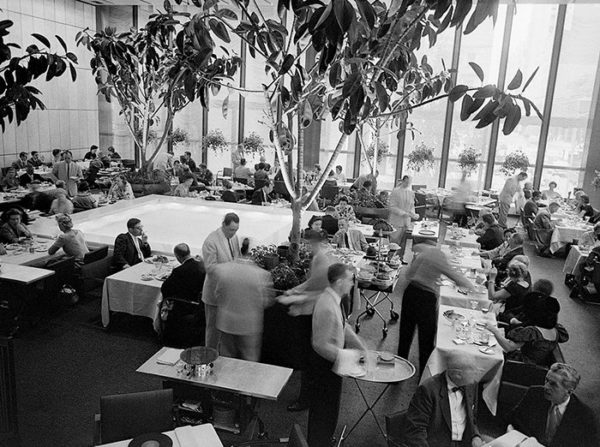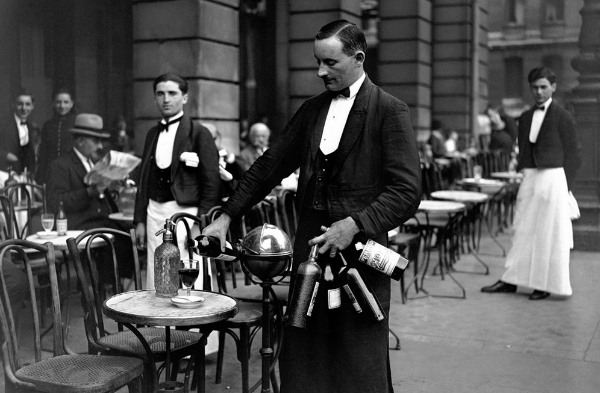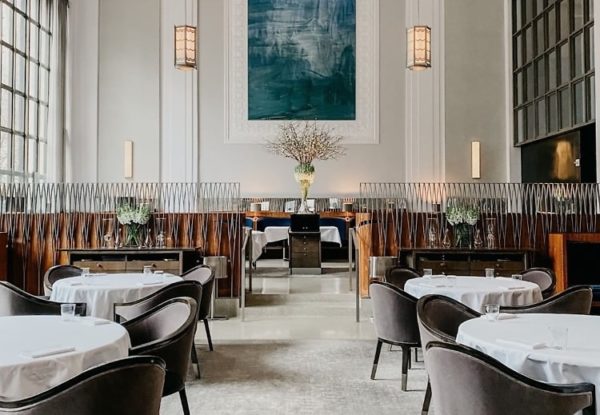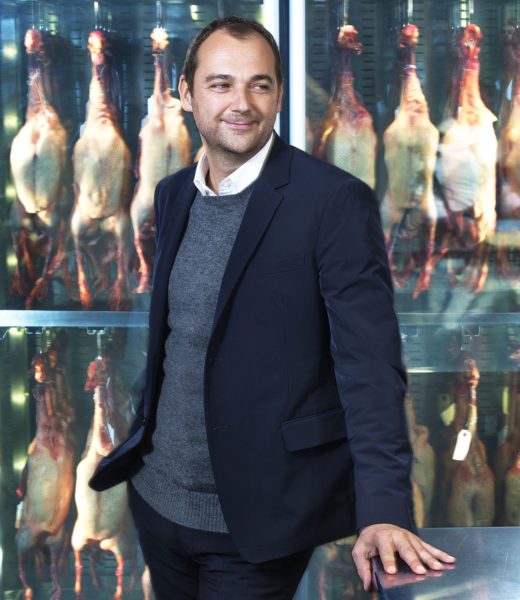Fine dining restaurants have always been fashion accessories, but gaining access to the most exclusive ones has become a badge of honor. Helen Rosner wrote about our unhealthy obsession with scoring rezzies in The New Yorker Magazine this week, chronicling her successful efforts to infiltrate the gated community of Carbone, the venerable upscale Italian-American restaurant in Greenwich Village. Carbone is notoriously one of the most difficult tables in New York City. (Full disclosure: I worked as a captain there several years ago.) While Rosner relishes in her thirty-dollar rigatoni and Caesar salad prepared tableside, she seems surprised by her own giddiness over having procured a coveted table at the same restaurant that Drake and Bella Hadid count among their personal favorites.
New York City underwent a seismic shift during the late 90’s when tony uptown celebrity haunts like Coco Pazzo and Sign of The Dove were supplanted by the velvet-rope cool of clubby restaurants downtown like Leonardo DiCaprio’s old hangout Moomba, Asia de Cuba, and Balthazar. The surging enthusiasm for chefs and new food experiences, so commonplace today, was just beginning to froth, and the popularity of restaurants, once defined by longevity, had become fleeting and manic. Over the ensuing decades, the restaurant industry became a plutocracy, where reserving a table morphed into a Darwinian exercise that left some guests feeling imperial and others feeling inadequate.
Diners began to measure their own self-worth by their ability to gain entry into the hottest restaurants. Cracking the code often necessitated mounting a full-frontal assault, pulling out any and all stops to get a foot in the door. Exclusive restaurants had always been dimly-lit boudoirs for consummating business deals, but by the early 2000’s the romance was gone and the bedrooms had become bordellos.
Insecurity about being excluded from trendy places, rarely justified, is consistently the source of guests’ most toxic behavior. As the food writer Alicia Kennedy points out in her most recent newsletter, restaurant workers are forced to carry the emotional burden for those insecurities. Maybe this is why so few restaurant workers are returning to their jobs.
In her diagnosis of Carbone, Rosner concludes that, “Status, for those who partake, is an essential good.” She remains circumspect about how star-fucking and celebrity worship fester in restaurants like Carbone. But her piece still seems to suggest that this hierarchal nature is indelible to New York City dining, and, as concepts like Carbone colonize other cities like Miami, jockeying for a seat at the table will endure as a litmus test of a diner’s self-worth. “Landing an impossible reservation,” she sheepishly admits, “can prompt a weird, almost embarrassing feeling of triumph.” It is embarrassing.

I’ve seen customers have nuclear meltdowns over their inability to procure a table on their own terms, grown adults acting like squealing toddlers when they’re denied access. Management rarely sanctions ornery guests whose overtures cross the line. Hospitality professionals don’t have the luxury of meting out discipline. The commandments of customer service dictate that we must satisfy the needs of undeserving people, even those deluded into thinking that access to a restaurant will make up for their own feeling of inadequacy. It’s one of the many perils of our existence.
Measuring restaurants by the status they confer seems out of sync with the shifting political tides in America toward progressivism. In the awkward interregnum between the Trump to the Biden Presidency, American society has received the equivalent of an ideological high colonic, after four years of constipation caused by a political regime defined by pornographic Reaganism, corporate avarice and unmitigated personal excess. Restaurants have always made great dance partners for gluttonous people.
Since unconditional faith in free markets often widens wealth gaps and racial inequality, the winner-take-all environment, especially in high-end restaurants, hinders any real progress in addressing these issues. As #MeToo and Black Lives Matter gradually chip away at the armor, women and chefs of color continue to struggle penetrating the institutionalized disregard the restaurant industry has consistently shown them.
That’s why it’s so imperative that the food media avoid language that attaches status to certain restaurants and not others. It’s one thing to say a restaurant is good; it’s another to suggest that a restaurant is too good for you. Diners often pursue restaurants more aggressively that they perceive as forbidden fruit.
Hype has a cost. On the surface, treating restaurants this way dehumanizes them. They become precious baubles that exist to be owned and collected, inanimate objects whose primary purpose is to make people look fashionable like a pair of Prada shoes or a Gucci purse. If restaurants exist to make their patrons more fashionable, then the people who work in them are nothing more than glorified stylists. Their performance is only measurable by their faculty for making the people they serve look good.
Let’s begin by admitting that status in today’s fine-dining restaurants is dominated by whiteness. Just look at the way that the food media gushed over Daniel Humm’s decision to make Eleven Madison Park’s menu vegan when so many other acclaimed chefs like Dominique Crenn have lived in this space before him.
According to Rosner, everyone inside Carbone looks rich and “professionally beautiful.” I can’t speak to the racial makeup of the dining room that night, but I can say from my years in fine dining establishments that the majority of people who dine in them are also overwhelmingly white. Continuing to promulgate the status narrative (one that Rosner seems to feel a jaded nostalgia for) only bolsters the aspirational nature of whiteness as a criteria for exclusivity.
The food media may champion female chefs and chefs of color, but it rarely frames the story in terms of exclusivity and access.
Women and chefs of color may prepare all kinds of delicious food, but it’s unlikely that food media will ever portray experiencing it as exclusive or aspirational. That’s part of what has made it difficult for non-white, non-male chefs to compete for resources. There may be critics who promote the work of LGBTQ, BIPOC and female chefs, but even the staunchest allies rarely attach status to their admiration. When we read about them, these chefs always serve a different flavor of forbidden fruit, one that will never be potent enough to raise one’s self-worth. But we should never expect that from any restaurant experience in the first place.




